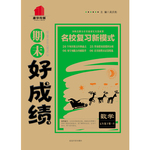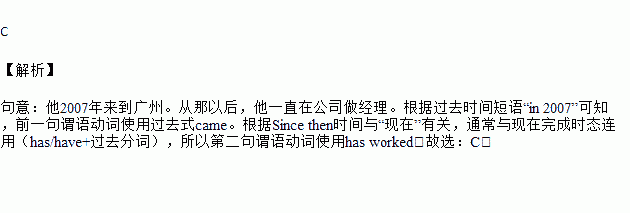��Ŀ����
He ________ in Guangzhou in 2007. Since then, he ________ as a manager in the company.
A. comes; works B. came; worked C. came; has worked D. has come; worked
 C
��������
���⣺��2007���������ݡ������Ժ���һֱ�ڹ�˾�����������ݹ�ȥʱ����in 2007����֪��ǰһ��ν�ﶯ��ʹ�ù�ȥʽcame������Since thenʱ���롰���ڡ��йأ�ͨ�����������ʱ̬���ã�has/have+��ȥ�ִʣ������Եڶ���ν�ﶯ��ʹ��has worked����ѡ��C��
C
��������
���⣺��2007���������ݡ������Ժ���һֱ�ڹ�˾�����������ݹ�ȥʱ����in 2007����֪��ǰһ��ν�ﶯ��ʹ�ù�ȥʽcame������Since thenʱ���롰���ڡ��йأ�ͨ�����������ʱ̬���ã�has/have+��ȥ�ִʣ������Եڶ���ν�ﶯ��ʹ��has worked����ѡ��C��
 ��ĩ�óɼ�ϵ�д�
��ĩ�óɼ�ϵ�д� 99��1������ĩ��ѵ��ϵ�д�
99��1������ĩ��ѵ��ϵ�д� ��ǿ��У��ĩ���100��ϵ�д�
��ǿ��У��ĩ���100��ϵ�д� �óɼ�1��1��ĩ���100��ϵ�д�
�óɼ�1��1��ĩ���100��ϵ�д���ɱ����Ķ�������ģ����ݶ�������,��ɱ�������ȱ����Ϣ��������𰸵�������ʽд�ڴ������Ӧ��λ�á�ÿ��һ�ʡ�
There are many libraries in Britain. Let's learn something about them.
Public libraries
Most towns in Britain have a public library. A library usually has a large selection of books and other resources, which library members can use and borrow for free.
Britain��s First Public Library
The first Britain��s public library opened in Manchester in 1852. Its first librarian was a man called Edward Edwards. Edwards attended the library��s opening ceremony and two famous writers called Charles Dickens and William Thackeray were there, too.
Services of library
Modern public libraries have something for everyone. Most of them have audio books, CDs, newspapers and DVDs as well as books to borrow.
How to Join a Library
To join a library, go to your local library and fill in a form. You'll receive a library card which is needed when using library services.
Mobile Libraries
Not everyone can get to a library. Some people live far away from towns and cities. Other people find it difficult to go out because they have an illness or a disability. Thanks to mobile libraries, these people can still borrow books.
The libraries are special. Unlike most libraries, which store books in buildings, mobile libraries usually keep their books in a mini-bus. The back of the mini-bus has shelves for the books, and it is big enough for borrowers to step inside and look around. A driver take the mini-bus to a certain place at a certain time, so people know when to expect it. They can return their books and borrow some more.
All Aboard the Library!
A school in London didn't have space for a library inside the building. However, everybody agreed that it was still important to have a school library So, the head of the school, Graham Blake, decided to park an old bus on the school car park and change it into a library. Pupils helped to paint the bus, and after eight months, the new library was ready.
Title | Libraries in1. |
2.Libraries | A large selection of books and other resources can be used and borrowed by library members for3.. |
Edward Edwards was the first4.of the first British public library. | |
Library 5. | Most of the6.public libraries have audio books, CDs, newspapers and DVDs as well as books for everyone. |
If you want to join the library, you must get a Library 7.. | |
Special Libraries | Thanks to8.libraries, those people who can't get to a library can still borrow books. 9.most libraries, a mini-bus with library books go to a certain place at a certain time. |
The school in London had to10. its library on an old bus because the school didn��t have enough space inside the building. |
 1.Britain
2.Public
3.free
4.librarian
5.Services
6.modern
7.card
8.mobile
9.Unlike
10.build
��������
���´��⣺������Ҫ�����ǽ�����Ӣ��һЩ��ͬ��ͼ��ݵ��ص����Ҫ��Ϣ��
1.�������ʡ�����There are many librarie...
1.Britain
2.Public
3.free
4.librarian
5.Services
6.modern
7.card
8.mobile
9.Unlike
10.build
��������
���´��⣺������Ҫ�����ǽ�����Ӣ��һЩ��ͬ��ͼ��ݵ��ص����Ҫ��Ϣ��
1.�������ʡ�����There are many librarie... �������
�Ķ����ж��ģ����ĺ�����������ĸ�ѡ����ѡ��һ����Ѵ𰸡�
"Look, it's Baldy!" A boy shouted in my direction across the playground. I was used to it because of the scars���˰� ��on my , it was still horrible to hear. I sighed (̾��) as I headed back to the class.
When I was just 20 months old, I suffered serious after a bowl full of hot oil fell on my head. I was sent to hospital and had to stay there for weeks while the doctors to save my life. "Holly's very to be alive," they told Mum and Dad. "But she'll be left with scars on her head, and of course her hair won't grow there."
As a child, I cared much about my scars, so I wore a scarf to cover them up when I left home .If I didn't, people would call me horrible names like Baldy. Although my friends were always comforting me , they never understood how it felt.
Then through the hospital I was to a children's burns camp, where children like me can get any help. There, I 14-year-old Stephanie, whose burns are a lot more serious than mine. But she is so that she never lets anyone put her down. "You shouldn't what people say about what you look like because we're not different from anyone else, Holly," she me, "And you don't need to wear a scarf because you look great it!" For the first time in my life I could speak to someone who'd been through something . So weeks later, at my 13th birthday party, encouraged by her bravery, I gave up my scarf and showed off my scars. It felt amazing not having to hide away behind my scarf.
Now, I am of what I look like and much happier, because I have realized it is your personality that decides who you truly are.
1.A. As B. When C. Although D. While
2.A. head B. ear C. face D. back
3.A. hunger B. cold C. loss D. burns
4.A. learned B. tried C. returned D. decided
5.A. happy B. lucky C. lonely D. poor
6.A. never B. usually C. seldom D. hardly
7.A. correctly B. nicely C. easily D. really
8.A. promised B. introduced C. reported D. carried
9.A. met B. organized C. remembered D. caught
10.A. honest B. strong C. active D. young
11.A. write down B. agree with C. pass on D. listen to
12.A. promised B. encouraged C. ordered D. calmed
13.A. in B. for C. without D. beyond
14.A. similar B. strange C. hard D. important
15.A. sick B. sorry C. tired D. proud
 1.C
2.A
3.D
4.B
5.B
6.B
7.D
8.B
9.A
10.B
11.D
12.B
13.C
14.A
15.D
��������
���Ȿ�Ľ��ܵ�����������ʱ��һ���¹ʣ�������ͷ�������˰̣������˰̴�û��ͷ�����������衣�����������ţ����ҡ������ˣ�һ���˵ĸ��Ծ���������˭��
1.1��C ...
1.C
2.A
3.D
4.B
5.B
6.B
7.D
8.B
9.A
10.B
11.D
12.B
13.C
14.A
15.D
��������
���Ȿ�Ľ��ܵ�����������ʱ��һ���¹ʣ�������ͷ�������˰̣������˰̴�û��ͷ�����������衣�����������ţ����ҡ������ˣ�һ���˵ĸ��Ծ���������˭��
1.1��C ... Mario is afraid of _________ alone.
A. be B. being C. is D. to
 B
��������
���⣺Mario����һ���˹µ�������be afraid of doing sth.��ʾ������ij�¡�be alone��ʾ�������������⣬��ѡB��
B
��������
���⣺Mario����һ���˹µ�������be afraid of doing sth.��ʾ������ij�¡�be alone��ʾ�������������⣬��ѡB�� Long, long ago there were only a few thousand people in the world. These people move form place to place over the land, hunting animals for food.
No one knows how or when these people learned about growing food. But when they did, their lives changed. They did not have to look for food any more. They could stay in one place and grow it.
People began to live near one another. And so the first village grew. Many people came to work in the villages. These villages grew very big. When machines appeared(����), life in the villages changed again. Factories were built. More and more people lived near the factories. The cities grew very big.
Today some people are moving back to small towns. Can you tell why?
1.The underlined word "They" in the second paragraph refers to ___.
A. villages B. animals C. cities D. people
2.When factories were built, ___.
A. more people live near the factories
B. people began to live in the factories
C. many people began to work in villages
D. many machines appeared in big factories
3.In what order did people do the following things?
a.Worked in villages b.Lived near the factories. c.Learned to grow food.
d.Built factories. e.Began to live near each other.
A. d, b, a, e, c B. e, a, c, d, b C. c, e, a, d, b D. a. c. d. e. b
4.We can learn from the passage that ___.
A. people like to work only in big cities
B. some people don't like to live in big cities
C. there will be no small towns in the future
D. it is better to live in cities than in villages
5.The best title of the text should be ___.
A. Cities or Villages B. Back to Towns
C. How Cities Grew D. People and Animals
 1.D
2.A
3.C
4.B
5.C
��������
������ƪ���ļĽ������������ķ�չ���̣�����������ѧ����ֲʳ�↑ʼ���Ӷ�����������������ſ�ʼ�������������ׯ����������������ڹ������������г��֡�
1.����ǰ��No one knows how or when these people learned about growing food. But...
1.D
2.A
3.C
4.B
5.C
��������
������ƪ���ļĽ������������ķ�չ���̣�����������ѧ����ֲʳ�↑ʼ���Ӷ�����������������ſ�ʼ�������������ׯ����������������ڹ������������г��֡�
1.����ǰ��No one knows how or when these people learned about growing food. But... It is raining, so I have to read at home instead of ________.
A. playing outside B. play outside C. to play outside D. played outside
 A
��������
���⣺�������꣬�����Ҳ��ò��ڼҿ���������������档A. playing outside �����ʶ���������棻B. play outside���ʶ���������棻C. to play outside���ʲ���ʽ���������棻 D. played outside��ȥʽ���������档instead of���棬����ofΪ��ʣ��������/����/�����ʡ���ѡ��A��
A
��������
���⣺�������꣬�����Ҳ��ò��ڼҿ���������������档A. playing outside �����ʶ���������棻B. play outside���ʶ���������棻C. to play outside���ʲ���ʽ���������棻 D. played outside��ȥʽ���������档instead of���棬����ofΪ��ʣ��������/����/�����ʡ���ѡ��A�� When our friends come to visit us in the evening, they spend their time telling us they are in a hurry or looking at their watches always. It isn��t that our friends are all very busy. It is just because we haven��t a TV set. They think that we are very strange.
But what do you do in the evening? They always ask. The answer is very simple. Both my wife and I have hobbies. We certainly don��t spend our evenings staring at the walls. My wife enjoys cooking and painting and often has evening classes for foreign languages. This is very useful because we often go to other countries for our holidays. I collect stamps and I am always busy with my collection. Both of us enjoy listening to music and playing chess together.
Sometimes there is power cut and the house is dark. We are not worried because we can just light candles and chat with each other about what we did before. Our friends are upset at that time because they don��t know what to do without a TV set. On such evenings, our house is always full because my friends all come to us. They all have a good time. Instead of sitting in silence in front of the television, everybody talks and plays games.
1.When friends visit my wife and me, they ____.
A. seem to be very busy B. feel very upset
C. like to talk much D. are very friendly
2.The couple haven��t a television, because ____.
A. they are not rich enough
B. they are strange people
C. they enjoy spending evenings in their own ways
D. they don��t know what to do when there is power cut
3.Both of the couple (����) are interested in ____.
A. learning languages B. traveling
C. collecting D. cooking
4.At night when there is no electricity, the couple ____.
A. have to stare at the walls B. have to go out for candles
C. will welcome many visitors D. do nothing and sit without any word
5.The writer tries to tell us that ____.
A. the television is useful B. electricity is important
C. life is enjoyable without television D. life is impossible without a television
 1.A
2.C
3.B
4.C
5.C
��������
��ƪ�����Ѷ����У���Ҫ�������ߵ��������ݷ����ߣ���Ϊ�˸ϻؼҿ����ӣ��Ҵ�ææ���뿪�������߷��������İ��ã�ͣ��ʱ�����ѻ������Ǽ��棬��ͬ�ȹ�����ʱ�⡣
1.ϸ�������⡣����When our friends come to visit us in the evening, they spend their ...
1.A
2.C
3.B
4.C
5.C
��������
��ƪ�����Ѷ����У���Ҫ�������ߵ��������ݷ����ߣ���Ϊ�˸ϻؼҿ����ӣ��Ҵ�ææ���뿪�������߷��������İ��ã�ͣ��ʱ�����ѻ������Ǽ��棬��ͬ�ȹ�����ʱ�⡣
1.ϸ�������⡣����When our friends come to visit us in the evening, they spend their ... You read his books, and he wants to read your books _ ___.
A. in all B. any more C. at all D. as well
 D
������������in all�ܹ����ϼƣ�any more���٣�����at all������������as wellҲ��ͬ���ġ����⣺����Ȿ�飬������Ҳ�������Ȿ�顣����ᄈ��֪ѡD��
D
������������in all�ܹ����ϼƣ�any more���٣�����at all������������as wellҲ��ͬ���ġ����⣺����Ȿ�飬������Ҳ�������Ȿ�顣����ᄈ��֪ѡD�� ��May I _______ your dictionary? ��Certainly, But you can��t ______ it to others.
A. borrow, keep B. lend, keep C. keep, borrow D. borrow, lend
 D
��������
���⣺�����ҿ��Խ�������ֵ��𣿡�����Ȼ���ԣ����㲻�ܰ���������ˡ����鶯�ʱ�������һ���գ����ݾ��⣺�ҿ��Խ�������ֵ���ָ���ǡ��ӱ��˴������������ʾ�����롱��������borrow���ڶ����գ����ݾ��⣺���㲻�ܰ���������ˣ�ָ���ǡ����Լ����н��ȥ������ʾ���������������lend���ʴ�ѡD��
D
��������
���⣺�����ҿ��Խ�������ֵ��𣿡�����Ȼ���ԣ����㲻�ܰ���������ˡ����鶯�ʱ�������һ���գ����ݾ��⣺�ҿ��Խ�������ֵ���ָ���ǡ��ӱ��˴������������ʾ�����롱��������borrow���ڶ����գ����ݾ��⣺���㲻�ܰ���������ˣ�ָ���ǡ����Լ����н��ȥ������ʾ���������������lend���ʴ�ѡD�� 
